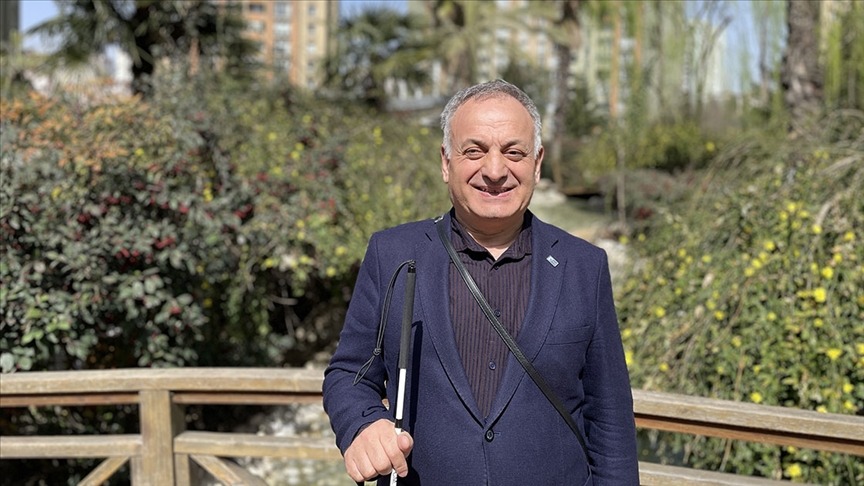Lokman Ayva is an extraordinary person who transformed personal adversity into national and international impactful social benefit. He was born in 1966 in a rural village in Türkiye and he lost his eyesight at the age of 11 due to meningitis. He withdrew from education and society for five years, because not only from his disability but also by a community that did not know how to include him. He encouraged by an uncle to listen to the radio, he came across a broadcast about a braille literacy course. That moment marked a turning point in his life. He wrote to the radio station and soon joined a boarding school for the blind, where for the first time he found hope, social interaction, and a sense of belonging.

Despite social stigma and family skepticism, Ayva excelled academically. He graduated top of his class and earned both a bachelor’s and a master’s degree in business administration from Boğaziçi University—one of Türkiye’s most prestigious institutions. It was during this period that he first began advocating for the rights of persons with disabilities—marking the beginning of what would become a lifelong commitment to inclusion and social justice.
Building on this foundation of advocacy and achievement, in 1994, long before he became a public figure, he founded the first Disability Coordination Center under Istanbul Metropolitan Municipality. This was a groundbreaking initiative that offered support services, rehabilitation programs, and community outreach—paving the way for municipal disability services across the country. He later became the founding president of the Beyazay Association of Türkiye, which remains one of Türkiye’s most influential disability organizations. Türkiye Beyazay Association, which has become the largest association that has 104 branches throughout Türkiye in the field of disability.
In 2002, Lokman Ayva became Türkiye’s first blind Member of Parliament, serving two consecutive terms. He transcended the traditional role of a Member of Parliament by using his position to amplify the voices of people with disabilities. He led key parliamentary efforts to expand employment opportunities for people with disabilities, most notably contributing to reforms in civil service law (Article 48-A7 of Law 657), raising the number of employed persons with disabilities in the public sector from 5,000 to over 70,000. He also championed the removal of copyright restrictions on audiobooks, expanded talking libraries, and ensured that disability pensions for women would not be cut upon marriage—directly empowering thousands of disabled women economically.
Internationally, as a member of the Parliamentary Assembly of the Council of Europe, he served as rapporteur on the right to education for children with disabilities, advocating for inclusive education as a human right. In 2010, he authored one of the most comprehensive and influential documents in Europe on inclusive education policy, which continues to serve as a key reference point in the advancement of the right to education for children with disabilities.
His work and impact have only grown stronger in recent years. Today, he continues his work through Beyazay Association of Türkiye, directing efforts to engage people with disabilities in high-tech, artificial intelligence, and digital literacy programs—ensuring they are not left behind in a rapidly evolving world.
Lokman Ayva’s life is a proof of disability does not define a person but vision does. And his vision has changed laws, institutions, and lives.
One of the most impactful achievements of Lokman Ayva in the past year was his continued leadership of the Beyazay Association of Türkiye, which launched a nationwide campaign promoting digital literacy and accessible technology use among persons with visual impairments. Through this initiative, over 3,000 visually impaired individuals received hands-on training in screen reader software, accessible mobile applications, and online safety. This project not only bridged the digital divide but also empowered participants to engage more actively in education, employment, and social life.
Another major highlight was his keynote speech at the 2025 National Disability and Inclusion Summit in Ankara, where he addressed policymakers, educators, and civil society leaders on the future of inclusive education. Drawing on both his personal experience and policy expertise, Ayva advocated for systemic reforms to ensure that educational content and environments are fully accessible to students with disabilities. His speech sparked national media coverage and renewed discussions on inclusive practices across Türkiye’s education system.
In addition to these accomplishments, Ayva recently initiated a new project under the Beyazay Association of Türkiye titled “Overcoming Barriers Through Skills: Economic Empowerment of Persons with Disabilities Through Vocational Training and Sustainable Business Models.” This initiative aims to support persons with visual and hearing disabilities—particularly women, youth, and refugees—by providing certified vocational training, establishing inclusive business models, and offering capacity-building in digital communication, marketing, and product development. Though implementation has not yet begun, this project is poised to become a transformative model for economic inclusion of disabilities and sustainability.
By combining grassroots action with high-level policy influence, Ayva continues to be a leading force in creating an inclusive, tech-savvy, and economically empowered future for persons with disabilities.
Throughout his professional career, Lokman Ayva has exemplified visionary leadership, resilience, and a deep commitment to social inclusion of all groups—delivering impactful projects that sit at the intersection of disability rights and equitable access to opportunity. As a blind man raised in a rural and socioeconomically disadvantaged region of Türkiye, he has personally faced the compounded challenges of disability, poverty, and cultural stigma. These experiences shaped not only his identity, but also the inclusive vision that guides his work today.
Ayva does not view disability as a personal limitation. He understands that disability inseparable from access to education, economic independence, public perception, and broader systems of inclusion or exclusion. Having once been a child whose own family struggled to imagine a future for him, he is now shaping policies and programs that create opportunities for others—especially those at the intersection of disability and other forms of vulnerabilities, such as low income.
His leadership has consistently focused on breaking structural and social barriers. From establishing Türkiye’s first municipal disability coordination center in 1994 to serving as the first blind Member of Parliament, he has consistently pushed boundaries—not just for recognition, but for representation, equity, and systemic change.
Ayva’s intersectional approach is evident in his wide-ranging work: advocating for disabled women’s financial independence, ensuring access to technology for rural disabled youth, and supporting inclusive vocational training programs for refugees with disabilities. He is not only a policymaker, but also someone who brings people and ideas together to build a more inclusive society.
In essence, Lokman Ayva lives and leads at the intersection of personal adversity and public empowerment. His ability to transform vulnerability into collective action makes him an unparalleled force in the global disability rights movement.
Lokman Ayva is more than an advocate—he is a living role model to the transformative power of inclusion, perseverance, and leadership. His journey from a small rural village in Türkiye to the halls of national and European parliaments is not only inspiring, but also a call to action for more accessible and equitable societies. He has not only broken barriers for people with visual impairments but has helped reshape the narrative around disability in Türkiye and beyond.
Throughout his career, he has held numerous powerful positions that underscore his impact: he served as a Member of the Turkish Grand National Assembly (2002–2011) as the country’s first blind MP, and was a member of the Parliamentary Assembly of the Council of Europe, where he chaired subcommittees and served as rapporteur on inclusive education. He was also the Founding Chair of the AK Party’s Disability Coordination Center and organized international conferences on disability, including the European Blind Union General Assembly and the Council of Europe’s Conference on Disability.
In addition, through his ongoing leadership of the Beyazay Association of Türkiye, he continues to pioneer innovative programs in education, digital accessibility, and employment for people with disabilities. As a speaker, educator, and policymaker, his ability to unite personal insight with structural reform has earned him an admiration across political, social, and international platforms.
Over the past year, Ayva has also led a new initiative under Beyazay Association of Türkiye titled “Overcoming Barriers Through Skills”, which focuses on empowering individuals with hearing and visual disabilities—especially women and youth—through certified vocational training, sustainable business modeling, and digital capacity building. The project place a strong emphasis on economic inclusion, digital marketing, and awareness-raising on disability rights, aiming to create a replicable and scalable model for inclusive employment.
He has also been a powerful voice for disabled children’s right to equal education, having played a central role in shaping one of the Council of Europe’s most influential initiatives on inclusive education. He continues to advocate against the structural discrimination many disabled children face in education systems, emphasizing the need for inclusive learning environments that foster dignity, participation, and academic success.
Through Beyazay Association of Türkiye, Ayva actively supports initiatives that encourage the economic independence of disabled women, such as eliminating discriminatory regulations that once cut off state impairment pension for women upon marriage. His work not only promotes inclusion—it dismantles long-standing policies that restrict independence and dignity.
Key Roles and Leadership Positions Held by Lokman Ayva:
- Founding Member of the Justice and Development Party (AK Party)
- Member of AK Party Central Executive Board (MKYK) (2001–2014)
- Founding Chair of the AK Party Disability Coordination Center (2001–2008)
- Member of the Turkish Grand National Assembly – İstanbul MP (22nd & 23rd Terms, 2002–2011)
- Member of Parliamentary Health, Family, Labor and Social Affairs Commission (2002–2011)
- Member of the Parliamentary Assembly of the Council of Europe (PACE) (2008–2011)
- Committee on Social, Health and Family Affairs
- Committee on Culture, Science and Education
- Committee on Equal Opportunities for Women and Men
- Chair, Subcommittee on European Social Charter and Employment
- Rapporteur, Right to Education for Children with Illnesses and Disabilities (2010)
- Representative on Ageing and Disability, Conferences in Dublin and Slovenia (2009)
- President of the Beyazay Association of Türkiye
- Chairperson, Council of Europe Conference on Disability (2010)
- Chairperson, ICEVI Europe Congress, Antalya (2013)
- Lecturer, National Federation of the Blind (USA) Convention (2006)
- Speaker, IFLA Conference on Accessibility, Egypt
- Founding President, Istanbul Metropolitan Municipality Disabled Persons Coordination Center (1994–1995)


